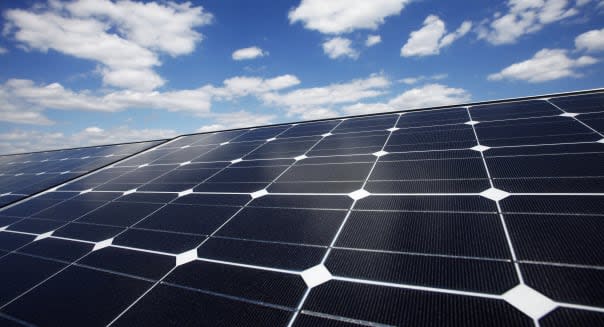High Rates Make SolarCity Bonds Shine, but Beware the Clouds

In recent years, people who need to earn income from their investments have faced a dilemma. Low interest rates have crushed returns on traditional safe investments like bank savings accounts and certificates of deposit, making it tough to make ends meet with a conservative portfolio. To get better yields, some used more aggressive investments like dividend stocks to get the cash they need.
Recently, solar installation specialist SolarCity (SCTY) stepped up with solar bonds -- but before you run out to try to harvest these attractive rates, you need to understand some things about risk.
The Appeal of Solar Bonds
It's not hard to understand why investors would be attracted to these solar bonds. Most bank savings accounts pay less than 1 percent currently, and one-year CDs don't pay much above 1 percent. Even if you're willing to lock up your money for five years, it's tough to find rates above 2.5 percent.
By contrast, a one-year SolarCity bond will yield 2 percent. Two-year bonds pay 2.5 percent; three-year bonds pay 3 percent; and seven-year bonds hit 4 percent.
Those figures are well above what you'd get from Treasury bonds, bank CDs, and similar investments from other corporations. Highly regarded companies like American Express (AXP), Amgen (AMGN) and JPMorgan Chase (JPM) all have three-year bonds outstanding that have yields in the 1 percent to 1.5 percent range -- less than half what SolarCity is offering.
The Risks of Corporate Bonds
However, there's a big caveat. Solar bonds don't have the same protections as bank products. Savings accounts and CDs are protected by the Federal Deposit Insurance Corp. up to $250,000, meaning that if an issuing bank goes out of business, you'll get every penny of your deposit back. Similarly, Treasury bonds are backed by the U.S. government, which means that it would take a default of the federal government for you not to get repaid on a Treasury bond.
By contrast, solar bonds are only obligations of SolarCity. The notes are unsecured, meaning that in the event of default, bondholders wouldn't have the right to make claims against the solar-panel systems that the company has installed in homes across the country. As the risk factors in the prospectus indicate, there are further limits on bondholders' ability to make claims against SolarCity, and some of SolarCity's other creditors would have priority in getting repaid for their obligations ahead of ordinary investors.
Mosaic Solar has offered similar opportunities in California and New York for a year and a half, with rates in the 4.5 percent range on longer-maturity bonds of about nine years.
The Case of Ford and GM
In the past, other corporations have issued bonds directly to investors, with mixed results. Historically, automakers Ford (F) and General Motors (GM) both issued fixed-rate notes through their finance arms that carried interest rates above the prevailing rates on CDs and savings accounts. As investors discovered during the financial crisis, though, these bonds are subject to the default risk of the underlying company, and for a long period, GM SmartNotes traded at high yields as distressed debt. Currently, Ford has stopped issuing new notes, and with GM's financing arm now known as Ally Financial (ALLY), it now offers its corporate notes in periodic offerings rather than on an ongoing basis through its website.
In the end, investing in SolarCity bonds is a bet that it will sustain its leadership position in the solar industry. Yet even with attractive interest rates, SolarCity's solar bonds involve a degree of risk that many income-seeking investors simply won't feel comfortable taking on.
Motley Fool contributorDan Caplingerisn't sure about solar bonds for his own portfolio, but he does own shares of SolarCity and Ford. You can follow him on Twitter@DanCaplingeror onGoogle+.The Motley Fool recommends American Express, Ford, General Motors, and SolarCity. The Motley Fool owns shares of Ford, JPMorgan Chase, and SolarCity.To read about our favorite high-yielding dividend stocks for any investor, check outour free report.

